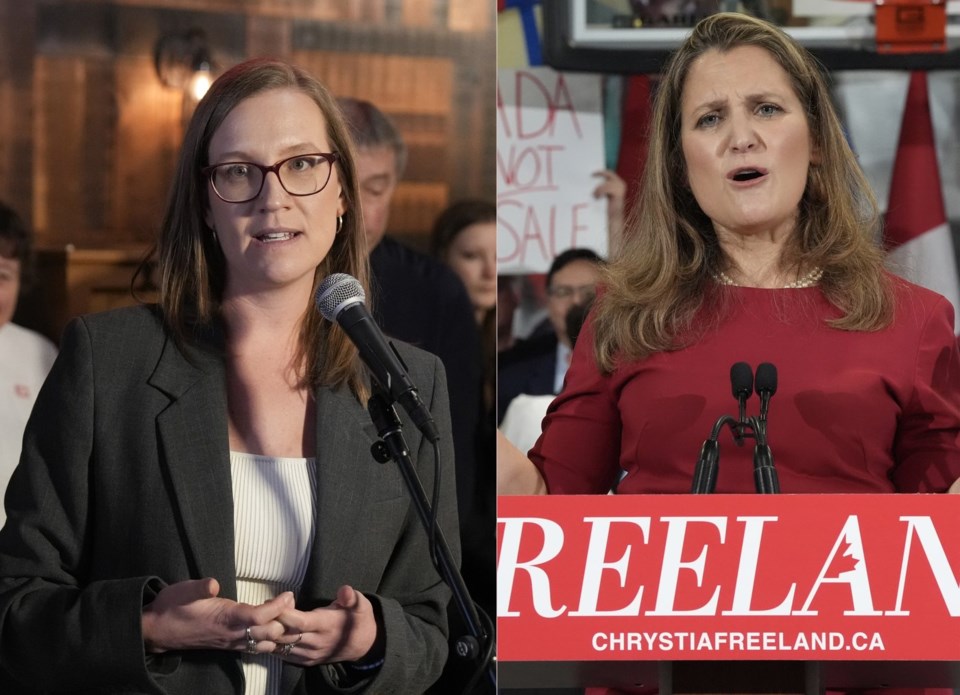OTTAWA — Two recent cabinet ministers officially launched their campaigns for Liberal party leadership Sunday, with each pledging a rethink of the federal carbon levy and a tough stance against U.S. president-elect Donald Trump.
At her launch event in Burlington, Ont., Karina Gould announced she would be stepping down as Government House leader to focus on the race and pledged to better reflect young Canadians. Just two Liberal MPs were present.
Moments later, former finance minister Chrystia Freeland vowed to use her experience to unify the country against Trump's tariffs at a Toronto rally attended by at least 10 MPs — and interrupted several times by pro-Palestinian protesters.
Between the two campaign launches, Foreign Affairs Minister Mélanie Joly announced she is backing former central banker Mark Carney for Liberal leader, in the race's first major endorsement from a Quebec minister.
Gould and Freeland both pledged to change federal carbon pricing – a constant target of attacks from the Conservative party – in their speeches.
Gould pledged to freeze the carbon price, but not to abolish it.
"We need to immediately cancel the increase to the price on pollution ahead of April 1," she said, adding that the Liberal party needs to make electric vehicles and efficient home heating more affordable.
Freeland said she would revisit carbon pricing because Canadians "don't like" the consumer levy, which makes some fuels more expensive but returns revenue to individuals and green retrofits.
"Democracy means when people tell you something, you have to listen. And I will say our party hasn't been good enough at that," she said.
A campaign spokeswoman later clarified that Freeland's pledge is to "replace the consumer carbon price with a system that will work within our federation and will be developed collaboratively with provinces and territories."
Freeland also provided more details about the disagreements with Prime Minister Justin Trudeau before she quit cabinet on Dec. 16.
"The difference didn't start then. For some time, I had been in disagreement with the prime minister, specifically over spending. Those disagreements got worse after president Trump threatened to impose 25 per cent tariffs on our country," she said.
Gould also called for "a serious review of the capital-gains tax increase," a policy the Liberals proposed that has faced pushback from the Conservatives, wealthy Canadians and business owners.
She said the policy should not threaten tech innovators and promised "more to say on that in the coming days."
Gould also claimed that the Liberals' backtracking on electoral reform — which she oversaw as minister of democratic institutions in 2017 — was due to the first Trump administration's tariffs distracting from other matters.
"If we were going to do something as big as bring(ing) forward electoral reform, we needed to have the energy of the country behind us," she said.
Gould suggested the country can't have another electoral-reform debate during the tariff threat, but could reopen the issue later.
Conservative Leader Pierre Poilievre's office noted on Sunday that both Freeland and Gould voted for the carbon levy dozens of times, and repeatedly spoke in favour of the policy.
The leader's office dubbed Freeland a "devoted disciple of the carbon tax" and quoted Trudeau's Jan. 6 resignation speech, in which the prime minister called Freeland "an incredible political partner through just about everything we have done as a government and as a party over the past decade."
In a news release, the Conservatives also noted that Gould was in charge during a high-profile mishap.
"As minister of social development, she was responsible for the brutal delays Canadians were forced to endure when they applied for a passport," it reads, referring to a massive post-pandemic backlog in processing passports while Gould was minister of families, children and social development.
Both Gould and Freeland argued the Conservatives would capitulate to U.S. demands in a tariff war.
Freeland accused Poilievre of being "weak" in addition to being "mean," and said he would "sell us out" to Trump.
"He's afraid to fight back against people he admires," she said.
Freeland's campaign rally in Toronto was interrupted several times by protesters who shouted and banged on a side door.
"Protest doesn't mean drowning out other people's voices; that is entirely unacceptable," she said.
In a written statement, protest organizers said they targeted Freeland's campaign because they are critical of the Canadian government's approach to the war in the Gaza Strip.
Freeland said she will seek re-election as a Liberal MP regardless of whether she wins party leadership, adding that all other contenders should make the same pledge.
She pitched herself as a steady hand to unify Canadians, citing her roles during the first Trump administration and the COVID-19 pandemic.
Gould said she has credibility as someone with deep roots in the party, and can mobilize youth to advance affordability, safe communities, functional health care and environmental protection.
"Canadians have lost trust in our party," said Gould, who at 37 is the youngest candidate in the race so far.
"It is time for a new generation of leadership … who's not going to stand behind a podium and read a speech that was prepared by somebody else — no. Someone who speaks from the heart."
Joly's endorsement of Carney comes in a race where none of the three most prominent candidates are Quebecers nor speak French as their first language. Former Quebec backbencher Frank Baylis is also running for leader.
Last week, some francophone pundits deemed Carney’s ability to read the French portions of his campaign launch speech and answer questions as insufficient for a debate between leadership candidates.
Candidates have until Jan. 23 to declare they are running and begin a series of entry fee payments to the Liberal party so they can join the race.
This report by The Canadian Press was first published Jan. 19, 2025.
Dylan Robertson, The Canadian Press



